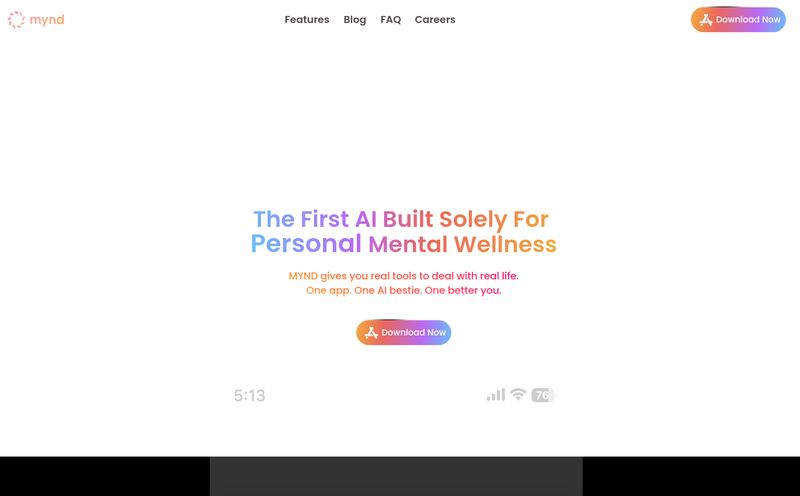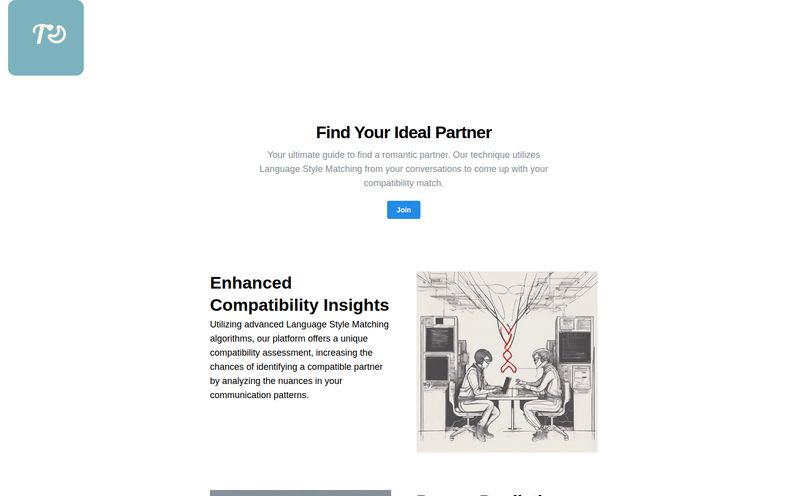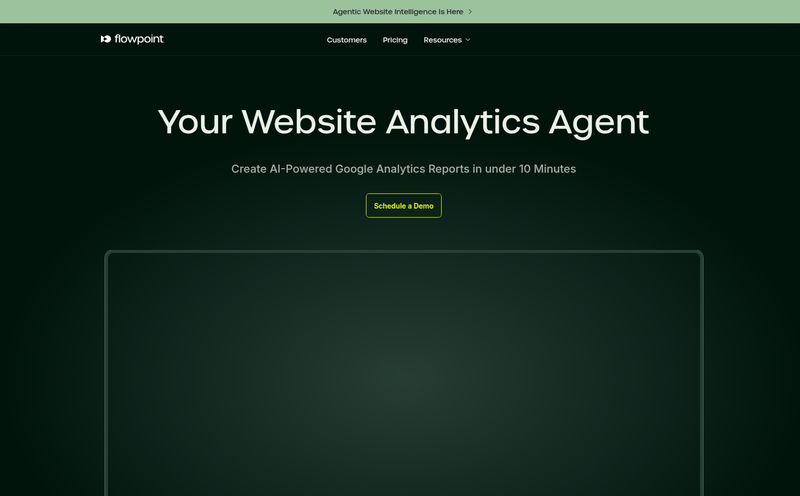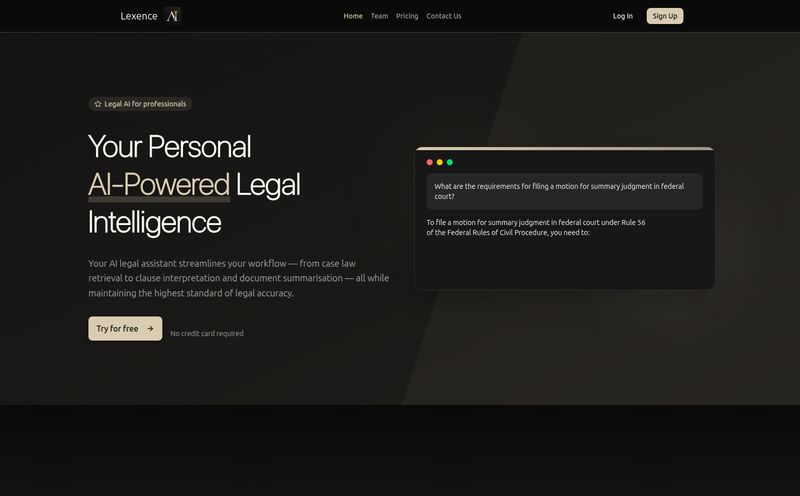If you've spent any time working with Large Language Models (LLMs) or building any kind of AI-powered system, you know the single biggest headache. It’s not the model training. It’s not the prompt engineering. It's the data.
Oh, the data. The endless, soul-crushing parade of messy PDFs, convoluted Word documents, and spreadsheets that look like a Jackson Pollock painting. We've all been there, right? Trying to feed this digital garbage into a sophisticated AI and expecting gold. It’s the classic “garbage in, garbage out” problem, but on an industrial scale. I’ve personally lost weekends trying to write Python scripts to parse tables from a scanned report, only to have it fail on the next document because of a slightly different layout. It's infuriating.
So when a tool like Monkt slides across my desk, claiming to be the universal translator for this mess, my skepticism is immediately matched by a glimmer of hope. Could this be it? The tool that finally lets us skip the data janitor work and get straight to the interesting stuff? I decided to take a look.
What Exactly Is Monkt? (And Why Should You Care?)
At its heart, Monkt is a data transformation platform. That sounds a bit dry, I know. Think of it more like a specialized refinery. You pour in your crude, unstructured data—PDFs, DOCX, PPTX, HTML files, even images—and out comes clean, structured, AI-ready fuel in the form of Markdown or JSON.
This isn't just a simple file conversion. I've used dozens of those. Monkt is designed specifically for the AI/LLM workflow. It understands that an AI doesn’t just need the text; it needs the context, the structure, the semantic meaning. It preserves things like headings, lists, and tables, which is absolutely critical for building things like accurate RAG (Retrieval-Augmented Generation) systems or fine-tuning custom models. Without that structure, you’re just feeding your model a wall of text.
The Core Features That Actually Matter
A features list can be boring, so let’s talk about what actually makes a difference in your day-to-day workflow.
From Any Document to Clean JSON or Markdown
This is the main event. Monkt supports a pretty wide net of formats: PDF, Word, Excel, PowerPoint, CSV, HTML, and various image files. The ability to get either clean, LLM-optimized Markdown or highly structured JSON is the core value proposition. The Markdown is great for knowledge bases (they even have an “Obsidian-Ready” conversion, which made the nerd in me very happy). The JSON output, however, is where the real power for developers lies.
The Power of Custom JSON Schemas
And speaking of JSON, this is a big one. You aren’t stuck with a one-size-fits-all output. Monkt lets you define your own custom JSON schema. Why is this a game-changer? Imagine you're processing thousands of invoices. You can tell Monkt, “I need you to find the ‘invoice_number’, ‘due_date’, ‘total_amount’, and a list of ‘line_items’ with ‘description’ and ‘price’.” It will then intelligently extract that specific data from each document and fit it into your predefined structure. This is how you build scalable, automated workflows. It’s deterministic, which means you can build applications on top of it without worrying that the data structure will change randomly. A huge win.
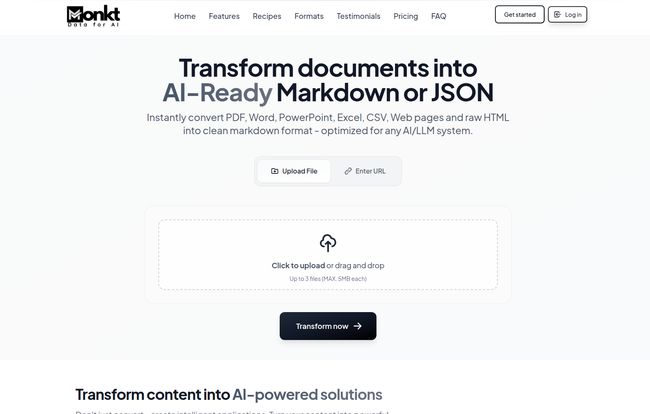
Visit Monkt
Automation at Scale with the REST API
For me, a tool without a good API is just a toy. A pretty UI for one-off conversions is fine, but the real business value comes from automation. Monkt provides a REST API that lets you integrate their entire processing pipeline into your own applications. You can batch process thousands of documents, set up workflows that automatically pull files from a source, process them through Monkt, and then send the structured data to your AI model or database. This is how you move from a manual process to a real, functioning system.
They also have this premium tech called DeepExtract™. It's designed to go beyond basic text and pull out the really tricky stuff—complex tables, figures, citations, even things from scanned documents using OCR. This seems to be their secret sauce for handling the nastiest of documents.
Let's Talk Money: A Breakdown of Monkt's Pricing
Alright, the all-important question: what’s this gonna cost me? The pricing structure seems pretty straightforward and aimed at different user levels. It’s nice to see a tool that caters to everyone from the solo tinkerer to the massive corporation.
| Plan | Price | Key Features |
|---|---|---|
| Start | $4.99 / month | 50 transformations/month, 15 MB file limit, 7-day data persistence. Good for individuals and small tests. |
| Pro | $14.99 / month | 1,000 transformations/month, 25 MB file limit, 30-day persistence, DeepExtract™, OCR, API access. This feels like the sweet spot for most serious users. |
| Enterprise | Contact Us | Unlimited persistence, faster GPU servers, advanced features, and custom support. For the big leagues. |
My take? The Start plan is a great way to kick the tires without breaking the bank. Five bucks is less than a fancy coffee. The 7-day data persistence is a bit of a bummer, but it forces you to build a workflow that processes and stores the data on your end, which is probably good practice anyway. The Pro plan, at $15, seems like incredible value for a professional or a small business. 1,000 transformations and access to the API and DeepExtract™ is very generous. The Enterprise plan is… well, if you need it, you know who you are.
My Honest Take: The Good, The Bad, and The Game-Changing
So, after playing around with it, what's the verdict?
The good is very, very good. The sheer breadth of supported formats combined with the quality of the structured output is impressive. The custom JSON schema feature isn't just a nice-to-have; it's a foundational piece for building serious AI applications. And the API seems robust. I love that they're not just building a tool, but a component that can be plugged into a larger machine.
What about the downsides? Well, no tool is perfect. The transformation limits on the lower-tier plans are something to be aware of. 50 transformations on the Start plan can go by quickly if you're doing batch tests. The file size limits (15MB on Start, 25MB on Pro) could also be a constraint for those working with massive, high-resolution scanned archives or gigantic datasets. You'd likely need to jump to Enterprise for that kind of work. It’s a classic SaaS model—give you enough to fall in love, then make you pay to scale. Can’t really fault them for it.
Frequently Asked Questions About Monkt
- What kind of file formats does Monkt actually support?
- It handles a wide range, including PDF, Word (DOC, DOCX), PowerPoint (PPT, PPTX), Excel (XLS, XLSX), HTML, and plain text files. It also has OCR capabilities for image files like JPG and PNG, which is great for scanned documents.
- How does the batch processing work?
- You can upload multiple documents at once through their web interface or, more powerfully, through the API. The system processes them in parallel, which is much faster than doing them one by one. You get notifications as jobs are completed.
- Is my data secure when I upload it?
- According to their site, all documents are encrypted both in transit and at rest. They also state that documents are automatically deleted after a certain period based on your plan (e.g., 30 days for Pro users) unless you specify otherwise, which is a decent security practice.
- Can I really define my own data structure for the output?
- Yes, and this is one of its best features. For JSON output, you can provide your own schema. This tells Monkt exactly what pieces of information to look for and how to structure them in the final file, ensuring consistency across thousands of different documents.
- What kind of support can I expect?
- All users get documentation and email support. Pro users get priority support, which is a nice perk. For Enterprise customers, it looks like they get dedicated support teams and SLAs, as you'd expect at that level.
- Can I try it before I buy it?
- Yes! They let you try their service with a sample document to see the quality of teh output. It's a great way to understand how it handles formatting and structure before you commit to a subscription. Highly recommended to do this.
The Final Verdict: Is Monkt Worth Your Time and Money?
Look, the age of AI is here, and the biggest barrier to entry for many is no longer compute power—it’s clean, usable data. We're moving past the era of just 'doing AI' and into an era of 'doing AI well'. And doing it well requires good ingredients.
Monkt positions itself as the master chef for your data kitchen. It takes your raw, messy ingredients and preps them perfectly for your five-star AI model. In my experience, the time and frustration it can save you from manual data cleaning is worth the subscription price alone. The Pro plan, in particular, hits a fantastic balance of price, features, and volume.
If you're a developer building AI-powered apps, a data scientist tired of parsing PDFs, or even just a knowledge worker trying to build a 'second brain' in Obsidian from a decade of old files, I think Monkt is absolutely worth a serious look. It's a sharp, focused tool that solves a very real, very annoying problem. And in my book, that's the best kind of tool there is.
